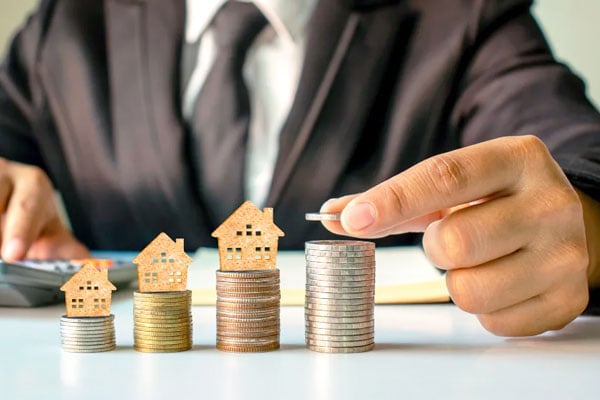
Key takeaways
There's a myth that you make your money on a piece of real estate when you buy it, but even the experts can't predict the absolute bottom or peak of the market.
Right now many property markets across Australia are growing strongly, which means that competition pushes property prices higher than expected.
People are paying a little over market value for real estate, and they're certainly not "making money" on the way in. The people who make money are the vendor, the selling agent, your conveyancer or solicitor, the government with their fair whack of stamp duty, and perhaps the property marketer or developer.
The myth of "making money when you buy" has caused many people to try and buy a bargain, thinking this is how they make their windfall. However, buying the wrong property is a one-off sugar hit.
In a location that will outperform the averages, you buy a rental property and hold it long-term to allow leverage, compounding, and time to work their magic.
There are really no bargains in today's property markets, except in poor locations. Focus on future growth instead of snagging a bargain today.
There’s a saying in property circles that you make your money on a piece of real estate when you buy it.
The gist of this is, that if you can negotiate really well and buy the property at the right time in the cycle, you’ll instantly manufacture some profits.
This myth has caused people to try and time the market, which is something that even the experts can’t do consistently.
I’ve been a student of the property market for more decades than I’d like to admit, yet I would never presume to predict the absolute bottom or peak of the market.
There are just too many variables to call.
Now I understand the theory, but I wholeheartedly disagree with this in practice – and here’s why.

Why you don’t make money on the way in
Right now many property markets across Australia are growing strongly.
They’re “hot” markets, which means there are plenty of buyers battling it out for each listing.
This competition pushes property prices higher, with prices often going far higher than the buyer, the seller, and even the agent’s expectations.
As a result, people are paying a little (or a lot) over what some would call “market value” for real estate.
And they’re certainly not “making money” on the way in.
In fact, most times, as a property investor you lose money when you buy your property.
Those who make money include the vendor, the selling agent, your conveyancer or solicitor, the government with their fair whack of stamp duty, and perhaps the property marketer or developer.
So despite what you hear so many people say, I don’t believe you make your money when you buy your property.
Why invest in property, then – especially in a strong property market, where there’s a chance you’ll pay more than you would like to?
This is how you profit from property
I was chatting to an investor recently who is shopping for her next investment property.
She’s found a small strip of boutique properties in a growth location that she feels offers strong potential – they’re unique for the area, suit a range of people, are a little higher-end, but still in the first-home buyer price bracket, so they have wide appeal to both tenants and future buyers.
The first one hit the market for offers over $780,000 last month. After a small bidding war, it sold a week later for $810,000.
The next one (almost identical, but with a bigger courtyard and a better outlook) was listed for offers over $810,000, so she offered $830,000. She lost out to a buyer who was willing to pay ten thousand more.
“I’ll probably end up chasing the market and will pay $850,000 for the next one,” she told me.
She was being tongued in cheek – but she also understands property investing.

When I prompted her further, she said:
“I plan on holding it for at least 20 years as an investment so I can live off the rental income when I retire.
"By that stage it’ll be worth triple what I’ve paid, and I won’t really care if I paid $800,000, or $850,000 or even $900,000 for the place.”
In other words: what’s important is that you buy a quality growth property and have exposure to a growing asset, rather than the specific price that you pay.
The myth of “making money when you buy” has caused so many people to try and buy a bargain, thinking this is how they make their windfall.
Yet if you buy the wrong property, this is a one-off sugar hit.
You make a little extra profit at the beginning by scoring an under-market deal, but what about the property’s long-term growth potential?
You’re better off buying the right property at a fair price
Because over time, the stronger capital growth and rental growth you will receive, will deliver better returns.
You make money by buying the right property, which is:
- An investment-grade property
- In a location that will outperform the averages
- Due to the local demographics - higher income earners – meaning other owner-occupiers will push up the value of surrounding properties and your tenants will be able to afford to pay more rent over time.
Then you hold it long-term and allow leverage, compounding, and time to work its magic.
This is a long-term focus – rather than the short-term focus of trying to make money when you buy.
There are really no bargains in today’s property markets, other than in poor locations.
At the end of the day, a cheap property today is most likely a secondary property in a poor location and will always be a secondary property.
Focus on future growth instead of snagging a bargain today, and you’ll be much more likely to grow your wealth.














